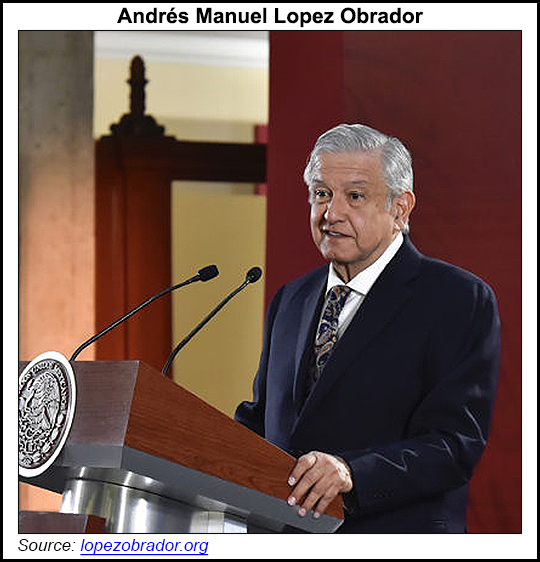Regulatory | NGI All News Access | NGI The Weekly Gas Market Report
Mexico Industrial Chamber Rebukes AMLO Energy Policies, Cites Importance of Natural Gas Supply
Mexico industrial chamber Canacintra on Monday issued a rebuke of President Andrés Manuel López Obrador’s state-first energy policies, calling for the return of oil and gas bid rounds, stressing the vital importance of natural gas and electricity to the economy and warning against regulatory changes that favor Mexico’s state-owned energy companies over their private sector competitors.

“We strictly oppose the historic regression that…the cancellation of bid rounds for hydrocarbon exploration and production blocks would represent,” the group said.
López Obrador suspended bid rounds in 2019, saying that contracts already awarded must begin to “show results” before the tenders can resume.
Canacintra said that the suspension of bid rounds amounts to the “de facto cancellation” of Mexico’s 2013-2014 constitutional energy reform, which ended the monopolies formerly held by state oil company Petróleos Mexicanos (Pemex) and state power company Comisión Federal de Electricidad (CFE) in the hydrocarbon and electricity segments, respectively.
The president this month called the reform “a complete failure,” and said that oil and gas bid rounds will not resume this year. Local oil and gas trade group Amexhi responded by saying that its members are fulfilling 100% of their investment commitments.
Canacintra cited a laundry list of reasons for which the energy reform was necessary, including “critical alerts” on the natural gas pipeline grid when supply of the molecule was acutely scarce, surge pricing by Pemex and CFE to disincentivize industrial energy consumption during peak demand hours and a lack of production of clean-burning fuels to reduce local air pollution and the emission of greenhouse gases.
Additionally, Canacintra said, “We reject normative changes or agreements at the Comisión Reguladora de Energía (CRE) to artificially strengthen CFE and Pemex or inhibit private investment in the electricity, gasoline, diesel and liquefied petroleum gas (LPG) markets,” Canacintra said.
CRE is roughly analogous to the U.S. Federal Energy Regulatory Commission, with a purview that includes permitting and regulations in the midstream oil and gas segment.
“We respectfully invite the federal government…to open a dialogue with all the relevant actors in Mexico to define an energy policy that projects Mexico toward the future that we want to see in 30 years,” the group said, citing that energy accounts for 30-60% of total costs for the industrial sector.
Mexico’s business community has, at times, appeared to reach breakthroughs in a tense relationship with the president. Billionaire Carlos Slim and the Consejo Coordinador Empresarial (CCE) business council, for example, were instrumental in brokering a resolution to a contractual dispute that was halting the operation of the 2.6 Bcf/d Sur de Texas-Tuxpan natural gas pipeline.
The president’s rhetoric toward the private sector, however, has continued to toggle back and forth between conciliatory and combative.
Canacintra called on authorities to “strengthen the confidence of investors” through an energy policy based “on the framework of laws currently in effect,” warning that this cannot occur when the rules change from one day to the next.
The chamber said that although Pemex and CFE played “a historic role” in Mexico’s growth during the 20th century, the energy challenges of the modern world are too vast for a state monopoly to take on alone.
“Today, these productive state companies must strengthen their administration and financial profile to compete in an open market, with increasingly high environmental, quality and security standards…”
Canacintra continued, “Energy policy models based on state monopolies in the production of electricity and hydrocarbons,” with a focus on collecting revenue for the state, “demonstrated over time their inefficacy for Mexico. The productive assets of CFE and Pemex fell into obsolescence and their reserves declined in a critical manner, due to the excessive fiscal burden to which they were subjected, and to the lack of resources available to make investments, indispensable to supply electricity and fuels of adequate quality to a growing population and industry in expansion.”
Canacintra implored the federal government “to take rational public policy decisions that allow economic growth with justice, as the only route for the sustained improvement in the living conditions of Mexicans.”
Energy in all its forms, including “electricity, natural gas, oil, gasoline, LPG, etc.,” is “indispensable” for Mexico’s economy to grow and be competitive, the group said, as well as for creating jobs and fighting inequality.
“To be competitive, defend our markets and generate jobs, the industrials of Canacintra supported and accompanied in 2014, Mexico’s energy reform, through frank dialogue and democratic consensus with the political forces represented in congress,” the chamber said. It noted that Mexico would not have been able to stabilize its plummeting crude oil output in 2019 without the help of private-sector operators, which are currently supplying about 47,000 b/d of oil production and have pledged to produce 280,000 b/d by 2024.
© 2024 Natural Gas Intelligence. All rights reserved.
ISSN © 2577-9877 | ISSN © 2577-9966 | ISSN © 1532-1266 |
